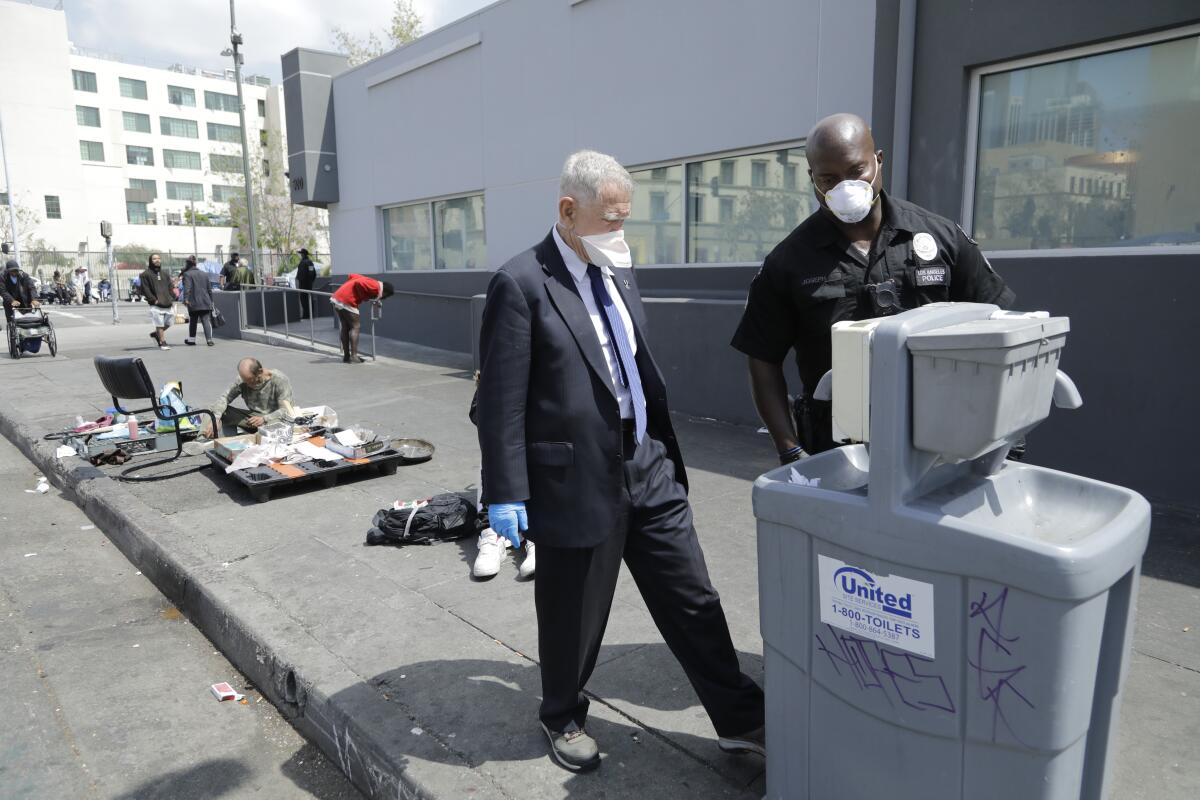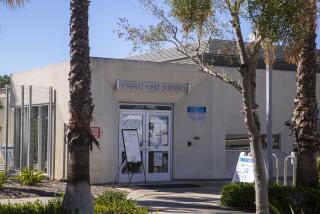Needed to fight coronavirus, L.A. could lose 50 hand-washing stations for homeless people

- Share via
It was meant to be a simple plan to stave off a coronavirus outbreak among homeless people: install dozens more hand-washing stations and portable toilets on the streets of Los Angeles.
Then one day last week, the plan got complicated.
An employee of Andy Gump Inc. — a family-owned portable restroom rental company — was doing his job, emptying the wastewater from a hand-washing station in Historic Filipinotown near a needle exchange.
He moved to put the hose to pump wastewater back into his truck, when suddenly, he was stabbed. A syringe, possibly used, had gotten jammed into the hose and got him.
“The needle pierced through his protective rubber gloves, the latex gloves he was wearing underneath, and through his skin all the way down to the bone,” according to a court filing in a federal lawsuit about homelessness in Los Angeles.
The incident has prompted the company to say it would remove all 50 hand-washing stations that it had been contracted to install — dealing a blow to the city’s efforts to provide ways for homeless people to maintain basic hygiene and avoid contracting the coronavirus.
Representatives of Andy Gump didn’t respond to repeated calls for comment.
The employee was sent to the emergency room and has been ordered to take a host of preventative drugs, including anti-HIV treatment, for six months, according to court documents.
It’s not clear from court documents whether all of the hand-washing stations will be removed. As of Friday, the city reported that just five had been.
“The city is working with Andy Gump to keep these life-saving hygiene facilities available to persons experiencing homelessness while at the same time addressing the company’s legitimate concerns about the safety of its employees who deploy and service this equipment,” city attorneys said in the court documents.
As L.A. prepares for coronavirus cases, efforts to get homeless people off the streets and to secure hotel rooms for patients are off to an uneven start.
This incident came to light after U.S. District Judge David O. Carter toured skid row Friday. He has ordered L.A. city and county officials to appear in court Tuesday, because “the sanitation facilities in skid row continue to be inadequate to meet the exigencies of the COVID-19 health crisis.”
In court documents, he described trying to use hand-washing stations that didn’t work and recounted talking to an employee of Andy Gump who told him that he had been instructed to remove some stations.
Last week, Mayor Eric Garcetti said the city was having trouble procuring more hand-washing stations and toilets, amid widespread concern that an outbreak of COVID-19 in the homeless population could have catastrophic consequences for all of California.
Last week, an employee of the Union Rescue Mission shelter was confirmed to have it, becoming the first known case on skid row.
On Monday, Barbara Ferrer, director of the Los Angeles County Department of Public Health, said there were now 12 cases in the homeless community. She said one person may have resided in a shelter while potentially infectious but declined to say the location of the shelter.
According to court documents, the city has been able to acquire 50 portable toilets and 60 hand-washing stations for skid row, in addition to the roughly 360 hand-washing stations and 120 portable toilets with sinks that the city acquired from various vendors in recent weeks.
The mayor’s office did not immediately provide clarification on the information in the court documents.
Times staff writers Melanie Mason and Emily Alpert Reyes contributed to this report.
More to Read
Sign up for Essential California
The most important California stories and recommendations in your inbox every morning.
You may occasionally receive promotional content from the Los Angeles Times.






